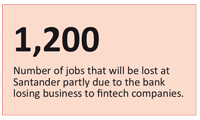Growing Spanish fintech sector creating new client pool for law firms
Fintech companies from around Europe see opportunities for expansion in the Spanish market as customers ditch traditional banks, which are being forced to close branches and cut jobs
Spain is seeing growth in its financial technology, or ‘fintech’, sector, with various local banks and financial institutions setting up fintech-focused ventures, with start-ups from other countries also eyeing the Spanish market.
According to Pablo García Mexía, of counsel at Ashurst, the emergence of fintech has two significant ramifications. The first, and most wide-reaching, is the application of digital technology in the banking sector. This is something that has been happening for a while as the banks have had to quickly adopt new technology to better handle transactions. The second significant impact is the emergence of a new sector of companies, or start-ups, that are entering the financial sector to compete against banks.
 Extortion risks
Extortion risks
García Mexía describes such technological changes as disruptive as they are changing the way transactions are carried out in that there is an increasing use of online banking, cloud computing and digital applications by a wide variety of companies to streamline their operations. “All of this brings enormous legal repercussions and challenges,” García Mexía says, citing the issue of online payments as the largest concern. Such payments give rise to issues related to privacy and cyber security, as well as the risk of fraud and extortion. “But despite the risks, companies are obliged to adopt these new practices in order to remain competitive, and this applies to the financial sector,” he adds.
As was the case with e-commerce, fintech has raised initial fears regarding privacy and security, García Mexía says. He adds that such issues will create a new challenge for law firms, both in terms of potential litigation and the need to keep pace with the latest developments.
Recent developments have included French marketplace lending platform Lendix receiving approval from the Spanish financial regulator CNMV to operate in Spain (see box). Meanwhile, another French fintech company Linxo – which has 900,000 users – is also reportedly considering expansion into the Spanish market. Earlier this year, it emerged that leading Spanish bank BBVA was setting up a fintech-focused venture capital firm – Propel Venture Partners – which would have $250 million to invest.
 High street banks suffer
High street banks suffer
The emergence of fintech companies is having a devastating effect on more traditional banking operations. The extent of the damage suffered by high street banks was demonstrated earlier this year when it emerged that Santander would be closing 450 of its branches and axing 1,200 jobs in Spain.
“Fintech is a growth sector, and both a competitor of the banks and a sector that complements the banks,” says Fernando Mínguez, a partner specializing in financial institutions at Cuatrecasas, Gonçalves Pereira in Madrid. He adds that the sector is beginning to attract a lot of talent from the financial, technological and regulatory sectors. “However, fintech does not yet have its own regulatory framework and such companies will be governed by financial regulations and not by specific rules for that sector – there will be more general credit regulations for example.”
 Fintech ‘sandbox’
Fintech ‘sandbox’
Mínguez says that, in future, there should be a more specific regulatory framework governing fintech, citing the example of the UK’s Financial Conduct Authority (FCA). “The FCA has developed a fintech ‘sandbox’, which is a kind of friendly regulatory framework to encourage the growth of such firms,” he explains. “It’s a new area that is generating much interest among law firms, as fintech firms are sensitive to certain risks and are therefore potential clients – evidently there will be more legal issues going forward, because financial transactions inevitably imply risk.”
The emergence of fintech also demands a harmonious collaboration between law firms’ IT and financial departments, García Mexía says. This is because issues and litigation concerning digital transactions will inevitably involve a number of different law firm departments, requiring lawyers to be up to date on developments.












